Hey there! Are you a bearded dragon parent and wondering why your bearded dragon sleeping so much? Don’t worry; we’ve got you covered! On average, they need 8-12 hours of sleep every single day.
From baby bearded dragons to adult beardies, there could be various reasons behind their increased sleepiness. Factors like the winter months, brumation (a deep sleep-like state), bright light, or even a loud noise can affect their activity level. However, it’s essential to rule out potential issues like calcium deficiency or illness.
Let’s explore the causes behind your bearded dragon’s extended naptime and ensure their well-being as pet owners!
Bearded Dragon Sleeping So Much: Everything Explained
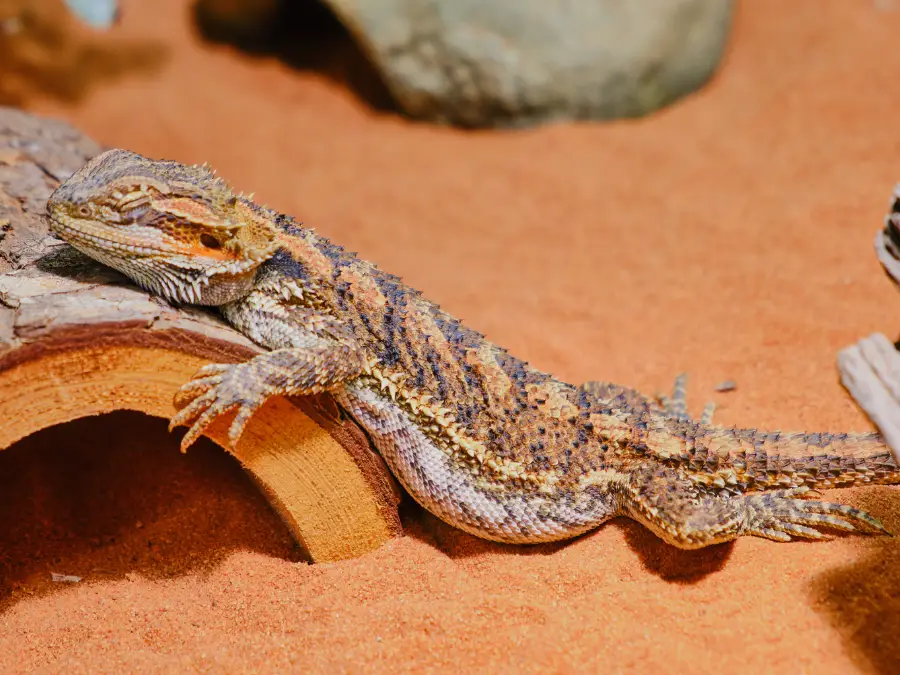
Bearded dragons are fascinating reptiles that make popular pets, but sometimes their behavior can be puzzling to their owners. One common concern is when a bearded dragon appears to be sleeping too much, leaving their owner wondering if this is normal or a sign of an underlying issue.
There are several reasons why a bearded dragon might sleep more than usual, ranging from natural changes in their life cycle to potential health problems. To better understand what could be causing this excessive sleepiness, it is crucial to learn about some of the common factors, including brumation, shedding, and dietary issues.
By examining these causes and observing your bearded dragon’s behavior, you can ensure that they remain healthy and happy in their environment.
Understanding Bearded Dragon Sleep
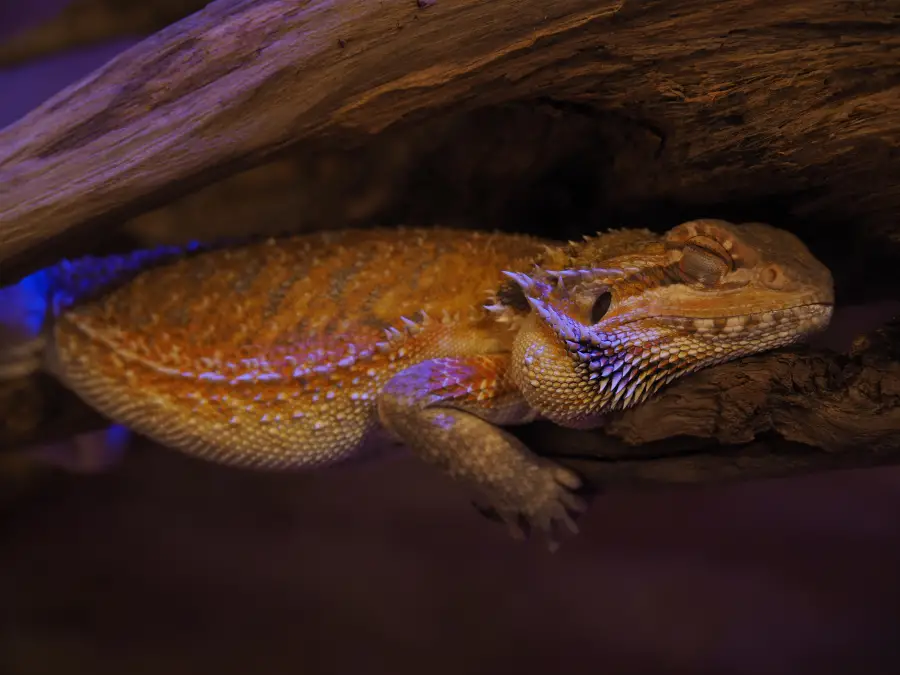
Sleep Patterns
Bearded dragons are diurnal animals that are active during the day and sleep at night. Various factors, such as habitat temperature, lighting, and general health, can influence their sleep patterns. It’s essential to monitor your bearded dragon’s sleep patterns to ensure adequate rest and promptly identify any potential issues.
Brumation Vs. Hibernation
Brumation is a natural process for bearded dragons, occurring as a response to seasonal temperature changes. It is similar to hibernation in mammals but not identical. During brumation, bearded dragons will sleep more, eat less, and become less active.
This behavior can last for several weeks or even months. It’s crucial to understand that brumation is a normal part of a bearded dragon’s life cycle, and proper care should be provided during this time.
Factors Influencing Sleep Behavior
There are several factors that can influence your bearded dragon’s sleep patterns. Some of these are:
- Light and temperature: Bearded dragons need proper light and temperature conditions in their enclosure to maintain regular sleep patterns. A temperature gradient should be provided, with a basking area around 95-105°F and a cooler area around 75-85°F. In addition, a correct day and night cycle should be maintained with around 12-14 hours of light during the day.
- Stress: Stressful conditions can affect your bearded dragon’s sleep and cause them to sleep more or have irregular sleep patterns. Identifying and resolving stress factors, such as an improper enclosure setup or inadequate social interaction, can help improve their sleep.
- Diet and hydration: A balanced diet and access to clean water are essential for maintaining a healthy sleep pattern. Providing a mix of proper nutrients will help keep your bearded dragon healthy and well-rested.
- Health issues: If your bearded dragon is sleeping too much, it could be an indication of an underlying health issue. Continuous observation and proper care will help identify and address any health problems as soon as possible.
By understanding these factors and providing proper care, you can help ensure that your bearded dragon maintains a healthy sleep pattern, ultimately contributing to their overall well-being.
Baby Bearded Dragons Sleeping A Lot? Watch this video
Reasons for Excessive Sleeping
Age
As bearded dragons grow older, their energy levels and activity may start to decrease. Younger dragons are more active during the day, while older ones may require more sleep.
This is a normal part of the aging process, and it’s essential to continue providing proper care to ensure your bearded dragon maintains good health as it ages.
Brumation
Bearded dragons, especially those older than one year, may experience a period of brumation, which is similar to hibernation. This occurs during the colder months, usually in the winter, when their metabolism slows down.
During brumation, your bearded dragon may sleep more and eat less. Providing the proper habitat and temperatures for brumation can help ensure a healthy sleeping pattern during this time.
Environmental Conditions
The environment in which your bearded dragon lives plays a significant role in influencing its sleep pattern. For example, improper lighting and temperature can cause your dragon to sleep more than usual. Bearded dragons are diurnal animals, which means they require a proper light-dark cycle to maintain their sleep-wake cycle.
Ensuring a consistent day-night cycle and maintaining appropriate basking temperatures in their habitat can help regulate their sleep patterns.
Health Issues
Excessive sleeping could also be indicative of underlying health issues. Shedding, dehydration, and improper nutrition could cause more sleepiness in your dragon. Observe your bearded dragon’s overall behavior, appetite, and hydration levels to determine if health issues may be the cause of excessive sleepiness.
It’s crucial to consult a veterinarian specializing in reptiles if you believe your bearded dragon may be unwell.
Stress and Relocation
Moving to a new environment, such as being transferred to a new habitat or changes in household surroundings, can cause stress in your bearded dragon, leading to excessive sleeping. It’s important to provide a comfortable and familiar environment to help reduce stress levels and ensure a healthy sleep pattern for your dragon.
To create a stress-free environment, consider:
- Providing ample hiding spots and decorations
- Maintaining consistent temperatures and lighting schedules
- Offering a balanced diet and clean water
- Limiting sudden or abrupt changes in their habitat
Addressing Environmental Factors
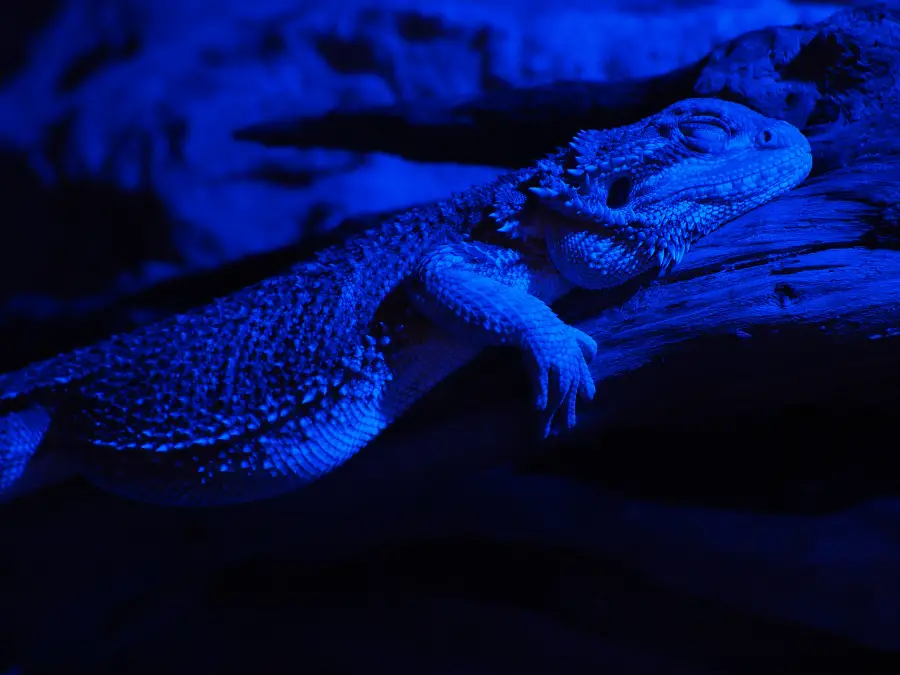
Correct Tank Temperatures and Lighting
To ensure your bearded dragon’s well-being, it is essential to maintain the proper tank temperatures. Adult bearded dragons require a basking area between 95-105°F (35-40°C) and a cooler area around 80-85°F (27-29°C). Adjust the basking area to a slightly warmer 100-110°F (38-43°C) for juveniles. A thermostat is a helpful tool for regulating the tank’s temperature.
Use the appropriate UVB bulb to provide the necessary lighting for your bearded dragon, usually a reptile-specific tube light that covers at least two-thirds of the tank length. Ensure a consistent lighting cycle of 12-14 hours of light and 10-12 hours of darkness to support their circadian rhythm.
Proper Diet and Nutrition
Providing a well-rounded diet is essential for your bearded dragon’s health and energy levels. Their diet should consist of:
- Protein: 50-80% insects like crickets and Dubia roaches
- Leafy greens: 20-50%, including collard greens, dandelion greens, and mustard greens
- Occasional fruits: 10% of their diet, such as berries, apples, and melons
Feed your bearded dragon once or twice a day, ensuring the food’s size is smaller than the space between its eyes. It’s crucial to dust their food with calcium and vitamin D3 supplements at least twice a week to prevent metabolic bone disease.
Enrichment and Stimulation
A stimulating and enriching environment can help reduce excessive sleeping in bearded dragons. Offer climbing branches, hiding spots, and toys to keep them engaged.
| Enrichment Item | Purpose |
|---|---|
| Climbing branches | Encourage natural climbing behavior and exercise |
| Hiding spots | Provide safety and comfort, reducing stress |
| Toys | Stimulate mental activities and reduce boredom |
Routine interaction, such as handling and brief time outside the tank, can also contribute to a healthier bearded dragon. Monitor your pet’s behavior and adjust the tank environment as needed to promote proper sleeping patterns and overall well-being.
Identifying Health Issues
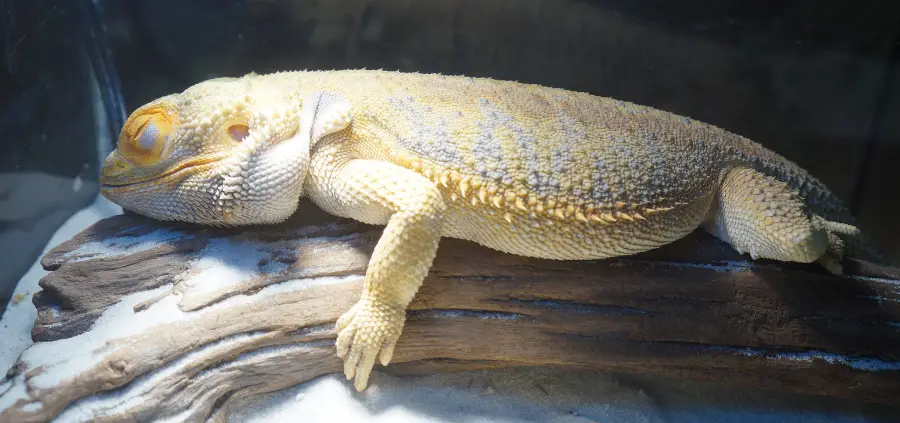
Illnesses and Parasites
Bearded dragons are susceptible to various illnesses and parasites that can result in increased sleepiness. Signs of illness may include weight loss, sunken eyes, and dehydration.
Additionally, parasites can also cause health issues in bearded dragons and may manifest as lethargy and sleepiness. It is important to consult a veterinarian for an accurate diagnosis and appropriate treatment when your bearded dragon exhibits signs of illness or parasites.
Metabolic Bone Disease
Metabolic Bone Disease (MBD) is a common health issue for bearded dragons. MBD occurs due to poor balance, or improper absorption of calcium in the diet. Bearded dragons with MBD may experience weakened bones, difficulty moving, and lethargy leading to increased sleepiness.
To prevent MBD, it is crucial to provide a proper diet, with calcium supplements as needed, and adequate UVB light exposure for optimal calcium absorption.
Impaction and Digestion Problems
Impaction is another health issue that can affect bearded dragons’ sleep patterns. It occurs when a bearded dragon has difficulty passing waste due to a blockage in their digestive system.
This problem can be caused by various factors, including ingestion of large or indigestible items, lack of proper hydration, or insufficient temperatures within their enclosure.
Digestion problems, such as impaction, can lead to discomfort, pain, and consequent sleepiness in bearded dragons as they try to conserve energy during healing. To help prevent impaction, ensure proper hydration and temperatures in their enclosure and monitor their diet for appropriate food sizes and types.
Reducing Stress and Anxiety
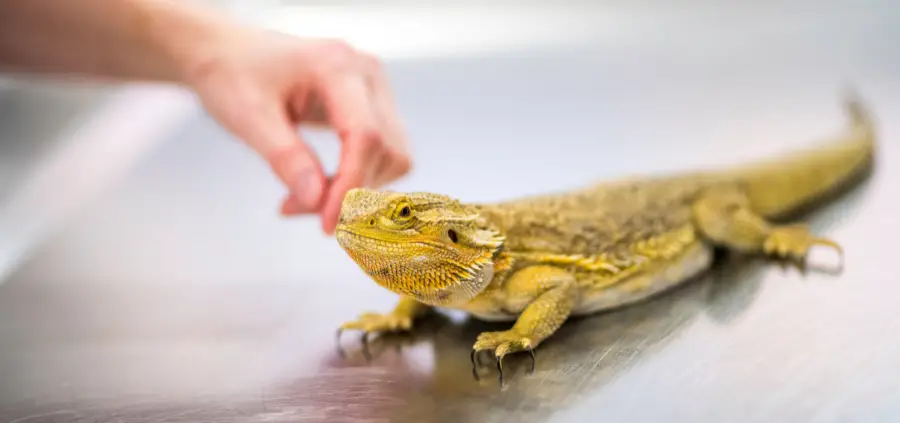
Proper Handling
One of the factors that can cause stress and anxiety in bearded dragons is improper handling. To reduce stress, it’s essential to handle your bearded dragon correctly. Start by gently sliding your hand under the belly, supporting their legs and tail. Then lift them slowly and securely.
Avoid sudden movements, and always approach your bearded dragon from the side, rather than from above. This way, they can see you and feel less threatened. Consistency in handling will help your bearded dragon become familiar and comfortable with you, reducing stress and anxiety.
Providing a Safe Hiding Place
A hiding place is an essential addition to your bearded dragon’s enclosure to help them feel safe and secure. Providing a safe hiding place for your bearded dragon can significantly reduce their stress levels.
There are many types of commercially available hides, or you can create your own using rocks, wood, or PVC pipes. Having a hiding place will allow your bearded dragon to retreat when feeling stressed, providing them with a sense of security and improving their overall well-being.
Monitoring Stress Marks
Stress marks can be an indicator of stress and anxiety in bearded dragons. These marks are dark lines or patterns that appear on their belly. Monitoring your bearded dragon’s stress marks can be an effective way to track their stress levels and make adjustments to their environment or handling as needed.
Keep an eye on the intensity of these marks, and make note of any changes. If you notice the stress marks becoming more prominent or consistent, it might be time to adjust your handling techniques, invest in a hiding place, or make necessary changes to their environment to reduce their stress.
When to Consult a Vet

If your bearded dragon is sleeping a lot, it may be due to natural causes like brumation or shedding. However, there could be underlying health issues that require veterinary attention. Here are some indicators that you should consult a vet:
- Prolonged lethargy: If your bearded dragon’s excessive sleep goes on for an extended period and is accompanied by a lack of appetite, weight loss, or other unusual behaviors, it’s crucial to seek a vet’s advice.
- Changes in behavior: A sudden change in your bearded dragon’s sleeping habits or behavior, especially if they appear stressed or agitated, may indicate an illness or discomfort that needs professional attention.
- Physical symptoms: If you notice any physical symptoms such as swelling, discoloration, or discharge, these could be signs of infection or injury. In such cases, it’s essential to get your reptile checked by a vet.
It’s particularly important to be vigilant about their behavior and health when dealing with baby bearded dragons, as they may be more susceptible to illness or stress. Keep an eye on their sleeping habits and consult a vet if you have any concerns.
Remember that while it’s natural to worry about your bearded dragon’s health, seeking professional advice from a vet who specializes in reptiles can provide the necessary guidance and reassurance.
They are better equipped to diagnose and treat any potential issues, ensuring your bearded dragon remains happy and healthy.
Conclusion: Bearded Dragon Sleeping So Much

Like any other living creature, bearded dragons require sleep to maintain their overall health and well-being. Various factors, including brumation, shedding, dietary problems, and changes in daylight availability can influence their sleeping patterns.
Ensuring the proper care and attention for your bearded dragon, including monitoring their diet, habitat conditions, and behavior, can prevent excessive sleepiness and promote a healthy lifestyle for your pet.
Providing your bearded dragon with appropriate lighting conditions is essential for regulating its sleep cycle. An adequate set-up habitat with consistent heating and lighting can help establish a normal sleep pattern and reduce the chances of your bearded dragon sleeping too much.
Addressing potential dietary issues by offering diverse fruits, vegetables, and insects will ensure your bearded dragon receives the necessary nutrients to maintain overall health. Ensuring proper hydration is also essential to prevent health complications and promote healthy sleep practices.
If you observe unusual or excessive sleep in your bearded dragon, it’s important to consider possible underlying problems, which may require consultation with a veterinarian. Monitoring your bearded dragon’s overall health and well-being will promote both a healthy sleep cycle and a thriving environment for your reptilian companion.
